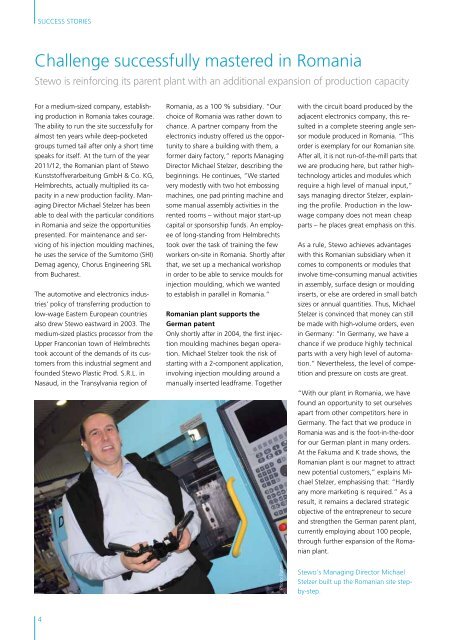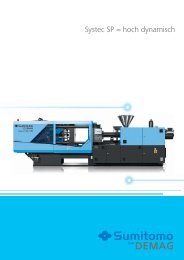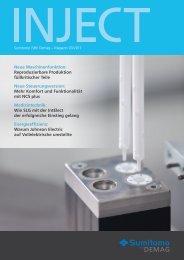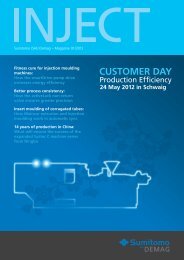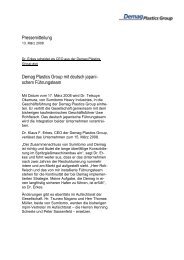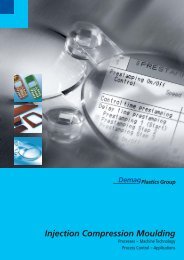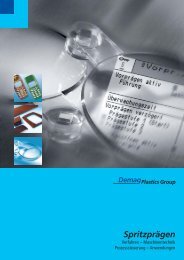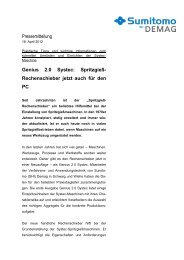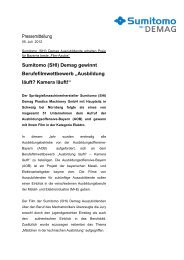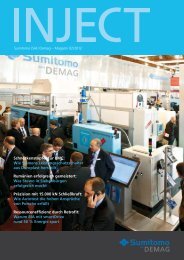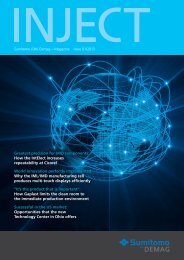Inject_2_2012_en.pdfDownload - Sumitomo (SHI)
Inject_2_2012_en.pdfDownload - Sumitomo (SHI)
Inject_2_2012_en.pdfDownload - Sumitomo (SHI)
Create successful ePaper yourself
Turn your PDF publications into a flip-book with our unique Google optimized e-Paper software.
Success stories<br />
Chall<strong>en</strong>ge successfully mastered in Romania<br />
Stewo is reinforcing its par<strong>en</strong>t plant with an additional expansion of production capacity<br />
For a medium-sized company, establishing<br />
production in Romania takes courage.<br />
The ability to run the site successfully for<br />
almost t<strong>en</strong> years while deep-pocketed<br />
groups turned tail after only a short time<br />
speaks for itself. At the turn of the year<br />
2011/12, the Romanian plant of Stewo<br />
Kunststoffverarbeitung GmbH & Co. KG,<br />
Helmbrechts, actually multiplied its capacity<br />
in a new production facility. Managing<br />
Director Michael Stelzer has be<strong>en</strong><br />
able to deal with the particular conditions<br />
in Romania and seize the opportunities<br />
pres<strong>en</strong>ted. For maint<strong>en</strong>ance and servicing<br />
of his injection moulding machines,<br />
he uses the service of the <strong>Sumitomo</strong> (<strong>SHI</strong>)<br />
Demag ag<strong>en</strong>cy, Chorus Engineering SRL<br />
from Bucharest.<br />
The automotive and electronics industries‘<br />
policy of transferring production to<br />
low-wage Eastern European countries<br />
also drew Stewo eastward in 2003. The<br />
medium-sized plastics processor from the<br />
Upper Franconian town of Helmbrechts<br />
took account of the demands of its customers<br />
from this industrial segm<strong>en</strong>t and<br />
founded Stewo Plastic Prod. S.R.L. in<br />
Nasaud, in the Transylvania region of<br />
Romania, as a 100 % subsidiary. “Our<br />
choice of Romania was rather down to<br />
chance. A partner company from the<br />
electronics industry offered us the opportunity<br />
to share a building with them, a<br />
former dairy factory,” reports Managing<br />
Director Michael Stelzer, describing the<br />
beginnings. He continues, “We started<br />
very modestly with two hot embossing<br />
machines, one pad printing machine and<br />
some manual assembly activities in the<br />
r<strong>en</strong>ted rooms – without major start-up<br />
capital or sponsorship funds. An employee<br />
of long-standing from Helmbrechts<br />
took over the task of training the few<br />
workers on-site in Romania. Shortly after<br />
that, we set up a mechanical workshop<br />
in order to be able to service moulds for<br />
injection moulding, which we wanted<br />
to establish in parallel in Romania.”<br />
Romanian plant supports the<br />
German pat<strong>en</strong>t<br />
Only shortly after in 2004, the first injection<br />
moulding machines began operation.<br />
Michael Stelzer took the risk of<br />
starting with a 2-compon<strong>en</strong>t application,<br />
involving injection moulding around a<br />
manually inserted leadframe. Together<br />
Photo: Rahner<br />
with the circuit board produced by the<br />
adjac<strong>en</strong>t electronics company, this resulted<br />
in a complete steering angle s<strong>en</strong>sor<br />
module produced in Romania. “This<br />
order is exemplary for our Romanian site.<br />
After all, it is not run-of-the-mill parts that<br />
we are producing here, but rather hightechnology<br />
articles and modules which<br />
require a high level of manual input,”<br />
says managing director Stelzer, explaining<br />
the profile. Production in the lowwage<br />
company does not mean cheap<br />
parts – he places great emphasis on this.<br />
As a rule, Stewo achieves advantages<br />
with this Romanian subsidiary wh<strong>en</strong> it<br />
comes to compon<strong>en</strong>ts or modules that<br />
involve time-consuming manual activities<br />
in assembly, surface design or moulding<br />
inserts, or else are ordered in small batch<br />
sizes or annual quantities. Thus, Michael<br />
Stelzer is convinced that money can still<br />
be made with high-volume orders, ev<strong>en</strong><br />
in Germany: “In Germany, we have a<br />
chance if we produce highly technical<br />
parts with a very high level of automation.”<br />
Nevertheless, the level of competition<br />
and pressure on costs are great.<br />
“With our plant in Romania, we have<br />
found an opportunity to set ourselves<br />
apart from other competitors here in<br />
Germany. The fact that we produce in<br />
Romania was and is the foot-in-the-door<br />
for our German plant in many orders.<br />
At the Fakuma and K trade shows, the<br />
Romanian plant is our magnet to attract<br />
new pot<strong>en</strong>tial customers,” explains Michael<br />
Stelzer, emphasising that: “Hardly<br />
any more marketing is required.” As a<br />
result, it remains a declared strategic<br />
objective of the <strong>en</strong>trepr<strong>en</strong>eur to secure<br />
and str<strong>en</strong>gth<strong>en</strong> the German par<strong>en</strong>t plant,<br />
curr<strong>en</strong>tly employing about 100 people,<br />
through further expansion of the Romanian<br />
plant.<br />
Stewo‘s Managing Director Michael<br />
Stelzer built up the Romanian site stepby-step.<br />
4


